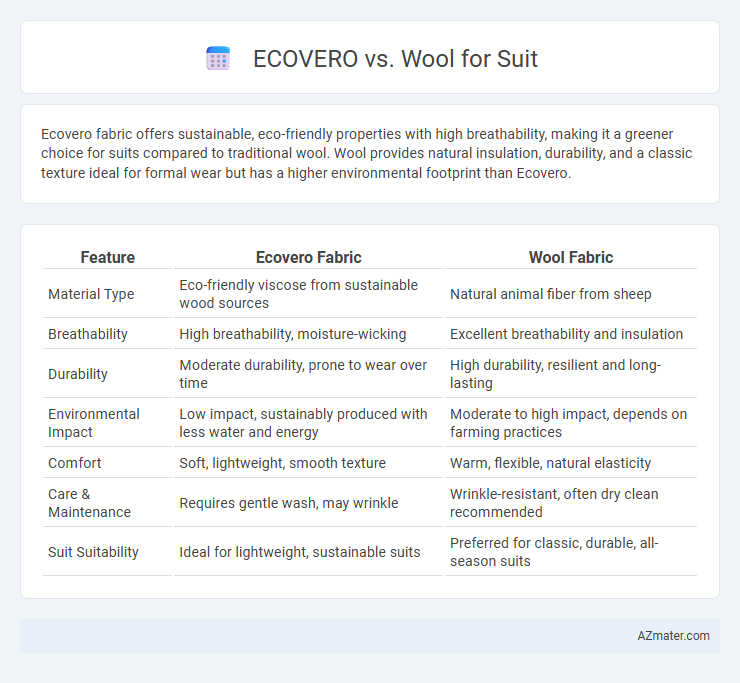Ecovero fabric offers sustainable, eco-friendly properties with high breathability, making it a greener choice for suits compared to traditional wool. Wool provides natural insulation, durability, and a classic texture ideal for formal wear but has a higher environmental footprint than Ecovero.
Table of Comparison
| Feature | Ecovero Fabric | Wool Fabric |
|---|---|---|
| Material Type | Eco-friendly viscose from sustainable wood sources | Natural animal fiber from sheep |
| Breathability | High breathability, moisture-wicking | Excellent breathability and insulation |
| Durability | Moderate durability, prone to wear over time | High durability, resilient and long-lasting |
| Environmental Impact | Low impact, sustainably produced with less water and energy | Moderate to high impact, depends on farming practices |
| Comfort | Soft, lightweight, smooth texture | Warm, flexible, natural elasticity |
| Care & Maintenance | Requires gentle wash, may wrinkle | Wrinkle-resistant, often dry clean recommended |
| Suit Suitability | Ideal for lightweight, sustainable suits | Preferred for classic, durable, all-season suits |
Introduction to Ecovero and Wool Fabrics
Ecovero is an eco-friendly fabric made from sustainably sourced wood pulp, offering a low-impact alternative to traditional textiles with breathability and softness ideal for suit construction. Wool, a natural fiber derived from sheep fleece, excels in insulation, durability, and wrinkle resistance, making it the classic choice for high-quality suits. Comparing Ecovero and wool highlights distinct benefits in sustainability and performance, influencing suitability for various suit styles and climates.
Environmental Impact: Ecovero vs Wool
Ecovero fibers, derived from sustainably managed eucalyptus trees, produce up to 50% less greenhouse gas emissions and use significantly less water compared to conventional viscose, making them an eco-friendly choice for suit fabrics. Wool, sourced from sheep, is biodegradable and renewable but may contribute to methane emissions and requires considerable land and water resources for sheep farming. Balancing environmental impact, Ecovero suits offer lower carbon footprints and resource consumption, while wool provides natural biodegradability and durability.
Fiber Source and Production Process
Ecovero fibers are derived from sustainably sourced wood pulp, primarily from certified European forests, using a low-impact production process that significantly reduces water and energy consumption compared to traditional viscose. Wool fibers come from sheep, requiring careful animal husbandry practices and involve processes such as shearing, cleaning, and spinning, which can vary in environmental impact depending on farm management and dyeing techniques. The production of Ecovero emphasizes eco-certifications and closed-loop manufacturing, while wool's sustainability depends on ethical grazing and land use, making fiber origin and processing methods critical factors in eco-friendly suit materials.
Comfort and Breathability Compared
Ecovero fiber offers excellent moisture-wicking properties and breathability, making suits comfortable for longer wear in warm conditions. Wool naturally regulates temperature and provides superior insulation, ensuring both warmth and ventilation through its natural crimp and fiber structure. While Ecovero excels in lightweight softness and eco-friendliness, wool remains the benchmark for durability and adaptive comfort in varied climates.
Durability and Longevity in Suits
Ecovero fibers, derived from sustainable wood pulp, offer moderate durability in suits but typically fall short compared to the resilience of wool. Wool suits excel in longevity due to their natural elasticity, wrinkle resistance, and ability to maintain shape over time under frequent wear. While Ecovero suits provide eco-friendly attributes, wool remains the preferred choice for durable, long-lasting suits that withstand regular use.
Style and Appearance: Ecovero vs Wool
Ecovero fabric offers a smooth, matte finish that provides a contemporary and eco-friendly look for suits, emphasizing sustainability without sacrificing style. Wool, known for its natural luster and classic texture, lends suits a timeless elegance and depth, enhancing the overall sharp appearance. Both materials support tailored fits well, but wool's natural insulation and richness in texture often create a more formal and traditional style compared to the modern, lightweight aesthetic of Ecovero.
Care and Maintenance Requirements
Ecovero suits require gentle washing with mild detergents and low-temperature settings to maintain fabric integrity and reduce environmental impact. Wool suits demand dry cleaning to preserve fiber quality, shape, and breathability, emphasizing the need for professional care. Both materials benefit from storage in breathable garment bags and regular brushing to extend garment life and appearance.
Cost and Affordability
Ecovero fabric generally costs less than wool, making it a more affordable option for suits without sacrificing sustainability, as it is produced from certified renewable wood sources. Wool suits tend to be pricier due to the natural fiber's quality, durability, and insulation properties, which contribute to their long-term value. For budget-conscious consumers seeking eco-friendly alternatives, Ecovero suits offer a competitive price point compared to traditional wool options.
Ethical and Sustainability Considerations
Ecovero, a certified sustainable viscose fiber produced from responsibly sourced wood pulp, offers a lower environmental impact with reduced water usage and greenhouse gas emissions compared to conventional viscose fabrics, making it an ethical choice for eco-conscious consumers. Wool, a natural and renewable fiber sourced from sheep, supports animal welfare standards and biodegradability but raises concerns around land use, methane emissions, and animal ethics depending on farming practices. Choosing between Ecovero and wool for suits involves balancing sustainable forestry and chemical management in Ecovero production against regenerative agriculture and animal stewardship in wool, where certifications like FSC for Ecovero and RWS for wool guide responsible sourcing.
Choosing the Right Suit Fabric: Ecovero or Wool?
Ecovero, a sustainable viscose fabric derived from responsibly sourced wood pulp, offers a lightweight, breathable alternative to traditional wool suits, making it ideal for warm climates or those seeking eco-friendly options. Wool, known for its natural insulation, durability, and wrinkle resistance, excels in colder environments and formal settings, providing a classic appearance and long-lasting wear. Selecting between Ecovero and wool depends on climate, comfort preferences, and sustainability priorities, with Ecovero emphasizing eco-conscious fashion and wool delivering timeless performance.

Infographic: Ecovero vs Wool for Suit
 azmater.com
azmater.com